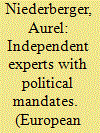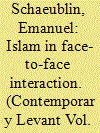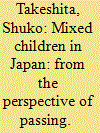| Srl | Item |
| 1 |
ID:
175557


|
|
|
|
|
| Summary/Abstract |
Some experts take on political mandates and simultaneously base their authority on a claim to independence: this balancing act enables international organisations (IOs) to incorporate ‘independent’ experts and generate ‘objective’ knowledge around their policies. However, how do these experts reconcile the contradictory roles of a mandated expert and an independent expert? I address this question by taking recourse to Goffman's sociology and two related concepts: sociological ambivalence refers to situations in which a person faces conflicting expectations. This conflict can be remedied through role distance, that is, behaviour that signals a degree of disaffection from the role one is currently performing while one simultaneously continues to perform that role. I conduct a case study of ‘independent’ experts hired by the UN Security Council to monitor sanctions, analysing how their position is sociologically ambivalent and how their knowledge practices are interlaced with performances of role distance. The findings have two implications for macro-phenomena: first, by keeping their contradictory role constellation functional, experts make it possible for IOs to mobilise ‘independent expertise’. Second, because experts perform role distance through the way they produce knowledge, role distance leaves traces in political knowledge.
|
|
|
|
|
|
|
|
|
|
|
|
|
|
|
|
| 2 |
ID:
169283


|
|
|
|
|
| Summary/Abstract |
Zakat is the Islamic obligation to give away a share of one’s moveable wealth for the sake of the community—primarily supporting people in need. Based on fieldwork in the Palestinian city of Nablus (2013–2014) where institutional channels for distributing zakat had become blocked due to security crackdowns in 2008, this article analyses direct zakat practices where givers and receivers confront one another in face-to-face interaction. In Nablus, openly displayed material want was assumed to ‘expose’ people living in poor households as well as their relatives and neighbours. Against this background, direct zakat manifested itself as discreet gestures of ‘covering’ need, while people not asking openly for support tended to be praised for their shyness and piety. In direct zakat transfers, people actively cared for how they appeared to one another in social interactions. This ‘ethical work’ of presenting oneself involved reading signs, embodying Muslim virtues and invoking God as the sole source of material provision. Considering the Islamic tradition’s presence within social interactions, this article seeks to understand how Muslim piety exceeds the individual and how the moral responsibility to cover the needs of others is socially distributed.
|
|
|
|
|
|
|
|
|
|
|
|
|
|
|
|
| 3 |
ID:
174810


|
|
|
|
|
| Summary/Abstract |
This study adopts Goffman’s concept of ‘passing’ to discuss the experiences of mixed children in Japan. Passing is ‘the management of undisclosed discrediting information about self’ and is a concept that has been evolved in the context of stigma. Since 1999, The author has conducted interviews with 139 mixed families of diverse nationalities and religions residing in Japanese urban areas. The aim of this research is to unravel two issues: First, do mixed children perceive their mixed background as a stigma? And second, do passing mixed children feel insecure or guilty about the fact that they are passing? This article concludes that whether or not the child is ‘visibly’ different from other children in Japanese society, and how their parents and teachers perceive their situations are major factors shaping the children’s experiences.
|
|
|
|
|
|
|
|
|
|
|
|
|
|
|
|